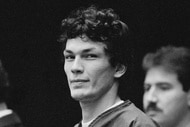Create a free profile to get unlimited access to exclusive videos, breaking news, sweepstakes, and more!
‘Borat 2’ Director On Capturing ‘Interesting Reality’ In New Peacock Docuseries
The director of the new Peacock docuseries believes that “we all streamline the events of our lives.”

Can you count on memories and first-hand accounts to accurately reflect a person’s experiences? Or do people either embellish or simplify details when they tell the stories of their lives?
The creators of “Paul T. Goldman,” a six-part Peacock docuseries premiering January 1 that has been in the works for a decade, considered those questions during production of the show.
The offbeat documentary series follows the saga of a seemingly ordinary man who faced a bizarre marital breakup as well as an alleged international crime ring. Goldman chronicled it all in his 2009 self-published book, "Duplicity: A True Story of Crime and Deceit." Goldman plays himself in the series opposite professional actors.
Director Jason Woliner, whose credits include “Borat Subsequent Moviefilm” and “Nathan for You,” was drawn to the docuseries executive produced by Seth Rogen, after a tweet from Goldman in 2012 led him to the memoir.
RELATED: Peacock's New Docuseries 'Paul T. Goldman' Blends Comedy With True Crime In Trailer
In a recent interview with Oxygen digital correspondent Stephanie Gomulka, Woliner discussed how his work on previous projects “helped inform” the Peacock series.
Through those experiences the director determined “how to create an interesting reality” for the new project. Once that framework was established for “Paul T. Goldman,” Woliner said, the challenge became “living in it and then figuring out how to capture it the right way.”
Woliner told Oxygen that he avoided “manufacturing” events. “I didn't write a line of dialogue in this whole show,” he said. “Everything is written by Paul.”
As with any story based on an individual’s memory, questions arose about whether incidents happened exactly as they were recalled. Were events exaggerated? Were some memories cloudy? Woliner recognized the potential gray area between memory and reality.
In the end, Woliner suggests that the docuseries may look beyond the singular life of Paul T. Goldman. The series explores, he said, the “universal way that we all streamline the events of our lives or change little memories or simplify things that help us function day to day.”
“Paul T. Goldman,” a six-part Peacock series, begins streaming on January 1.



























